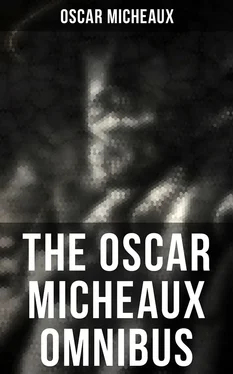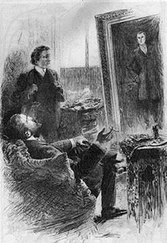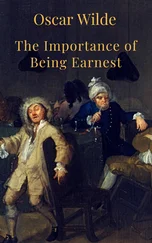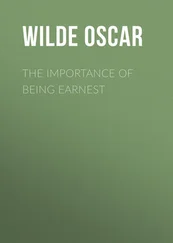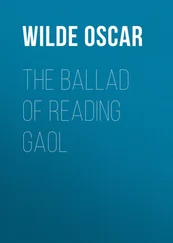About this time I began what developed into a flirtatious correspondence with a St. Louis octoroon. She was a trained nurse; very attractive, and wrote such charming and interesting letters, that for a time they afforded me quite as much entertainment, perhaps more, than actual company would have done. In fact I became so enamored with her that I nearly lost my emotional mind, and almost succumbed to her encouragement toward a marriage proposal. The death of three of my best horses that fall diverted my interest; she ceased the epistolary courtship, and I continued to batch.
Doc, my big horse, got stuck in the creek and was drowned. The loss of Doc was hardest for me to bear, for he was a young horse, full of life, and I had grown fond of him. Jenny mule would stand for hours every night and whinny for him.
In November, Bolivar, his mate—the horse I had paid one hundred and forty dollars for not nine months before—got into the wheat, became foundered, and died.
While freighting from Oristown, in December, one of a team of dapple grays fell and killed himself. So in three months I lost three horses that had cost over four hundred dollars, and the last had not even been paid for. I had only three left, the other dapple gray, Jenny mule, and "Old Grayhead," the relic of my horse-trading days. I had put in a large crop of wheat the spring before and had threshed only a small part of it before the cold winter set in, and the snow made it quite impossible to complete threshing before spring.
That was one of the cold winters which usually follow a wet summer, and I nearly froze in my little old soddy, before the warm spring days set in. Sod houses are warm as long as the mice, rats, and gophers do not bore them full of holes, but as they had made a good job tunneling mine, I was left to welcome the breezy atmosphere, and I did not think the charming nurse would be very happy in such a mess "nohow." The thought that I was not mean enough to ask her to marry me and bring her into it, was consoling indeed.
Since I shall have much to relate farther along concerning the curious and many sided relations that existed between Calias, Megory, and other contending and jealous communities, let me drop this and return to the removal of Calias to Megory.
The Nicholson Brothers had already installed an office in the successful town, and offered to move their interests to that place and combine with Megory in making the town a metropolis. But the town dads, feeling they were entirely responsible for the road striking the town, with the flush of victory and the sensation of empire builders, disdained the offer.
In this Megory had made the most stupid mistake of her life, and which later became almost monumental in its proportions. It will be seen how in the flush of apparent victory she lost her head, and looked back to stare and reflect at the retreating and temporary triumph of her youth; and in that instant the banner of victory was snatched from her fingers by those who offered to make her apparent victory real, and who ran swiftly, skillfully, and successfully to a new and impregnable retreat of their own.
The Megory town dads were fairly bursting with rustic pride, and were being wined and dined like kings, by the citizens of the town—who had contributed the wherewith to pay for the seven miles of right-of-way. Besides, the dads were puffed young roosters just beginning to crow, and were boastful as well. So Nicholson Brothers got the horse laugh, which implied that Megory did not need them. "We have made Megory and now watch her grow. Haw! Haw! Haw! Watch her grow," came the cry, when the report spread that the town dads had turned Nicholson's offer down.
Megory was the big I am of the Little Crow. Then Ernest went away on another long trip. It was cold weather, with the ground frozen, when he returned.
CHAPTER XVII
ERNEST NICHOLSON'S RETURN—THE BUILDING WEST OF TOWN—"WHAT'S IT ALL ABOUT"
Table of Contents
The big hotel from Calias had not long since been unloaded and decorated a corner lot in Megory. All that remained in Calias were the buildings belonging to Nicholson Brothers, consisting of an old two-story frame hotel, a two-story bank, the saloon, drug store, their own office and a few smaller ones. It was a hard life for the Caliasites and the Megoryites were not inclined to soften it. On the other hand, she was growing like a mushroom. Everything tended to make it the prairie metropolis; land was booming, and buyers were plentiful. Capital was also finding its way to the town, and nothing to disturb the visible prosperity
But a shrewd person, at that very time, had control of machinery that would cause a radical change in this community, and in a very short time too. This man was Ernest Nicholson, and referring to his return, I was at the depot in Oristown the day he arrived. There he boarded an auto and went west to Megory. On his arrival there, he ordered John Nogden to proceed to Calias, load the bank building, get all the horses obtainable, and proceed at once to haul the building to—no, not to Megory—this is what the Megoryites thought, when, with seventy-six head of horses hitched to it, they saw the bank of Calias coming toward Megory. But when it got to within half a mile of the south side, swerved off to the west. About six that evening, when the sun went down, the Bank of Calias was sitting on the side of a hill that sloped to the north, near the end of the survey.
Now what did it mean? That was the question that everybody began asking everybody else. What was up? Why was Ernest Nicholson moving the bank of Calias five miles west of Megory and setting it down on or near the end of the survey? There were so many questions being asked with no one to answer, that it amused me. Then someone suggested that it might be the same old game, and here would come a pause, then the question, "What old game?" "Why, another Calias?"—some bait to make money. Then, "Oh, I see," said the wise town dads, just a hoax. That answered the question, just a snare to catch the unwary. Tell them that the railroad would build to the Tipp County line. Sell them some lots, for that is what the "bluff" meant. Get their good money and then, Oh, Ha! Ha! Ha! it was too funny when one saw the joke, and Megoryites continued to laugh. Had not Nicholson Brothers said a whole lot about getting the railroad; and that it was sure coming up the Monca. It had come, had it not. Haw! Haw! Haw! Ho! Ho! Ho! just another Nicholson stall, Haw! Haw! Haw! and Nicholsons got the laugh again. The railroad is in Megory, and here it will stop for ten years. One hundred thousand people will come to Megory to register for Tipp County lands, and "Watch Megory grow" was all that could be heard.
Ernest would come to Megory, have a pleasant chat, treat the boys, tell a funny story, and be off. Nobody was mean enough or bold enough to tell him to his face any of the things they told to his back.
Ernest was never known to say anything about it. His scheme simply kept John Nogden moving buildings. He wrote checks in payment, that the bank of Calias cashed, for it was open for business the next day after it had been moved out on the prairie, five miles west of Megory.
The court record showed six quarter sections of land west of town had recently been transferred; the name of the receiver was unknown to anyone in Megory, but such prices, forty to fifty dollars per acre. The people who had sold, brought the money to the Megory banks, and deposited it. All they seemed to know was that someone drove up to their house and asked if they wanted to sell. Some did not, while others said they were only five miles from Megory, and if they sold they would have to have a big price, because Megory was the "Town of the Little Crow" and the gateway to acres of the finest land in the world, to be opened soon. "What is your price?" he would ask, and whether it was forty, forty-five or fifty per acre, he bought it.
Читать дальше
